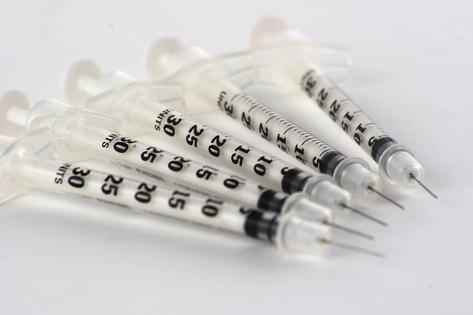Terrified of needles? That can affect your health
Published in Health & Fitness
No one likes getting stuck by a needle. Whether for a blood test, vaccination, or blood donation, needle sticks are something most people would prefer to avoid.
Yet, judging only by schedules for routine vaccinations and tests, the average healthy person can expect at least 165 needle sticks over a lifetime. Get hospitalized? That might add dozens or even hundreds more. And the number of needle sticks experienced by people with diabetes, HIV, and some other illnesses hovers in the “don’t ask” range.
For many, this may be more of an annoyance than a real problem. But if you have a strong fear of needles or aversion to the sight of blood, getting a vaccination or any other needle stick is a big deal. If this sounds like you, you may have trypanophobia.
What is trypanophobia?
Fittingly, the name combines the Greek term trypano — meaning puncturing or piercing — with phobia, meaning fear. This remarkably common condition is marked by irrational, extreme fear or aversion to blood or needles. It’s estimated that fear of needles affects up to 25% of adults, and may lead 16% of people in the U.S. to skip vaccinations. Many people who strongly fear needle sticks may avoid doctors and medical care, so it’s likely that the magnitude of this problem is underestimated.
Just to be clear: this phobia is not limited to people who are overly sensitive to pain or aren’t “tough enough.” It can affect anyone. The cause is often unknown, but a particularly traumatic experience during childhood medical illness may set the stage for some people. And there may be a genetic component. Researchers have found genes linked to fainting after needle sticks, and trypanophobia sometimes runs in families.
What are the symptoms of this phobia?
People with trypanophobia who are contemplating a needle stick may experience:
How does being afraid of needles affect you?
This fear can affect your:
What can you do to cope with a fear of needles?
There’s not much high-quality research regarding how best to treat trypanophobia. Still, experts suggest a number of options to help people cope with it.
Can therapy help?
Seeing a mental health specialist may be helpful. He or she may recommend:
The bottom line
It’s natural to have an aversion to pain, even when you know it’s coming and even though it’s for a good reason. So, if you’re one of the millions fretting about getting a COVID-19 vaccine or a blood test or any other needle stick, know that you’re not alone, and that there are things you can do to improve the situation. Talk to your doctor about your fear and get help if you need it. Your quality of life, health, and longevity could depend on it.
As for me, I’m going to do what I always do: avert my eyes and stare at that spot on the floor.
(Robert H. Shmerling, M.D., is a senior faculty editor at Harvard Health Publishing.)
©2021 Harvard University. For terms of use, please see https://www.health.harvard.edu/terms-of-use. Distributed by Tribune Content Agency, LLC.







Comments